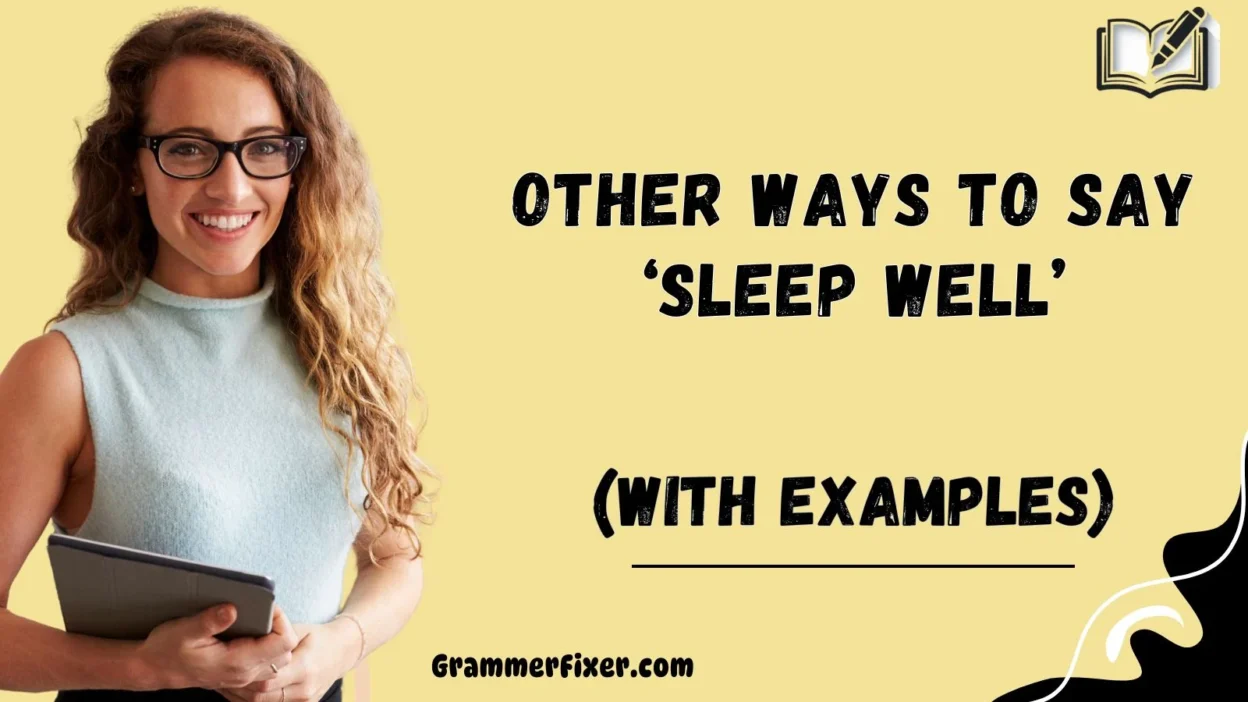Finding the right words to end the night can make your message feel more personal, warm, and thoughtful. Whether you’re saying goodnight to a partner, family member, close friend, or even a colleague, using alternatives to “Sleep Well” can bring comfort, tenderness, or even playfulness. These expressions go beyond routine nightly farewells—they carry emotion, nuance, and a personal touch that strengthens relationships.
In this guide, we’ll explore 30 alternatives to saying “Sleep Well,” complete with meanings, explanations, usage examples, and tones, so you’ll always have the perfect phrase for any situation.
What Does “Sleep Well” Mean?
The phrase “Sleep Well” is a caring goodnight wish that encourages someone to have a restful, peaceful, and uninterrupted night’s rest. It implies concern for the other person’s comfort, health, and emotional well-being.
When to Use “Sleep Well”?
You can use “Sleep Well” in a variety of settings—from casual chats with friends to affectionate goodnights with loved ones, or even in professional contexts when wishing colleagues rest after a long day.
Is It Professional/Polite to Say “Sleep Well”?
Yes, “Sleep Well” is both professional and polite, though tone matters. In business or formal settings, it’s best used with colleagues, clients, or mentors in a considerate but neutral way. In personal contexts, it can be more affectionate, playful, or even romantic.
Pros or Cons of Using “Sleep Well”
Pros
- Warm, thoughtful, and widely understood
- Works across formal and informal settings
- Conveys genuine care and reassurance
Cons
- Can feel predictable or repetitive if used too often
- May lack the personal charm or playfulness of more creative phrases
1. Sweet Dreams
Meaning: A classic way to wish someone a night filled with pleasant, comforting dreams.
Detailed Explanation: This phrase is gentle and affectionate, often used with partners, children, or close friends. It carries a sense of warmth, love, and tenderness.
Scenario Example:
- “Goodnight, sweetheart. Sweet dreams, I’ll see you in the morning.”
- “Rest easy tonight, kiddo. Sweet dreams!”
Best Use: With loved ones, children, or romantic partners when you want to sound nurturing and affectionate.
Worst Use: In formal or professional settings (e.g., saying it to a colleague or client) because it may come across as too personal or overly affectionate.
Tone: Warm, gentle, caring, and endearing.
2. Rest Up
Meaning: A casual way to encourage someone to recover energy and recharge for the next day.
Detailed Explanation: Unlike “Sweet Dreams,” this phrase is practical and supportive, emphasizing restoration and recovery. It works well after a busy or stressful day.
Scenario Example:
- “You’ve been working so hard today—rest up and get ready for tomorrow.”
- “Big exam in the morning. Rest up, champ.”
Best Use: With friends, family, or teammates who’ve had a long day or need encouragement before an important event.
Worst Use: In a romantic context, since it can feel too casual or impersonal when you want to convey affection.
Tone: Supportive, practical, and encouraging.
3. Sleep Tight
Meaning: A traditional goodnight phrase wishing someone a snug, cozy, and safe sleep.
Detailed Explanation: Originating from the days of rope-strung beds, “sleep tight” implies sleeping securely and comfortably. It’s widely recognized and often paired with the playful phrase, “don’t let the bedbugs bite.”
Scenario Example:
- “Goodnight, buddy. Sleep tight!”
- “Sleep tight, love—you’ve earned your rest.”
Best Use: With children, close friends, or family members, especially when you want to sound warm and familiar.
Worst Use: In a strictly professional message (e.g., to a boss or client) where it may sound too informal or whimsical.
Tone: Playful, friendly, and comforting.
4. Rest Easy
Meaning: A calm, reassuring phrase that wishes someone a peaceful, worry-free night.
Detailed Explanation: “Rest easy” implies letting go of stress, anxiety, or disturbances, making it perfect for someone who feels overwhelmed. It emphasizes comfort, reassurance, and calmness.
Scenario Example:
- “I know you’re stressed, but everything will be fine. Rest easy tonight.”
- “You’ve done all you can for today—time to rest easy.”
Best Use: With a stressed friend, partner, or family member who needs comfort and reassurance.
Worst Use: In a professional context where the person may not share a close bond with you; it can feel too intimate.
Tone: Gentle, soothing, and reassuring.
5. Have a Good Sleep
Meaning: A straightforward and practical alternative that wishes someone a refreshing night’s rest.
Detailed Explanation: This phrase is simple, direct, and easy to use in almost any context. It lacks the poetic charm of others but makes up for it with clarity and universality.
Scenario Example:
- “It’s been a long day. Have a good sleep and wake up refreshed.”
- “Travel safely tomorrow. For now, have a good sleep.”
Best Use: Works well in professional, casual, and personal contexts where a direct and polite farewell is appropriate.
Worst Use: With young children, since it may sound a little formal or bland compared to warmer phrases like “sweet dreams.”
Tone: Straightforward, polite, and neutral.
6. Pleasant Dreams
Meaning: A poetic and gentle phrase wishing someone’s dreams to be calm, joyful, and delightful.
Detailed Explanation: “Pleasant dreams” carries a more elegant, refined, and slightly old-fashioned tone. It works especially well in literary, romantic, or thoughtful contexts.
Scenario Example:
- “Goodnight, darling. Pleasant dreams until I see you again.”
- “Pleasant dreams, my friend. May tomorrow be even better.”
Best Use: With a romantic partner, close friend, or in creative/literary writing where you want to convey poetic warmth.
Worst Use: In a business email or formal workplace setting, as it can sound too intimate or flowery.
Tone: Refined, poetic, and warm.
7. Catch Some Z’s
Meaning: A casual, playful, and lighthearted way of telling someone to get some rest and sleep.
Detailed Explanation: This phrase leans on the cartoonish “Zzz” sound that symbolizes sleeping. It’s fun, informal, and whimsical, often used with friends, kids, or siblings.
Scenario Example:
- “It’s late! Time to catch some Z’s, buddy.”
- “Don’t stay up all night gaming—go catch some Z’s.”
Best Use: With friends, teenagers, or in humorous, informal contexts.
Worst Use: In a professional or romantic setting, as it can sound too silly or immature.
Tone: Playful, humorous, and casual.
8. Dream Sweetly
Meaning: A tender and affectionate way of wishing someone gentle and lovely dreams.
Detailed Explanation: This phrase has a poetic and nurturing quality, often implying a desire for the person to sleep peacefully and happily. It’s more emotional than “Sweet Dreams.”
Scenario Example:
- “Goodnight, my love. Dream sweetly and think of me.”
- “Dream sweetly, little one. Tomorrow will be a bright day.”
Best Use: With partners, children, or loved ones where tenderness is appropriate.
Worst Use: In a professional email or casual workplace chat, as it can feel overly romantic or sentimental.
Tone: Affectionate, tender, and poetic.
9. Sleep Peacefully
Meaning: A calm and soothing phrase wishing for rest without disturbances or worries.
Detailed Explanation: “Sleep peacefully” conveys reassurance and care, making it a comforting phrase for someone who feels anxious, stressed, or restless.
Scenario Example:
- “I know you’ve had a tough day. Sleep peacefully tonight—you deserve it.”
- “Don’t overthink. Just close your eyes and sleep peacefully.”
Best Use: With family, friends, or a stressed loved one who needs calm and reassurance.
Worst Use: With colleagues or acquaintances, since it can sound a little too intimate or personal.
Tone: Calming, reassuring, and gentle.
10. Hit the Hay
Meaning: A playful, informal way of saying it’s time to go to bed.
Detailed Explanation: This phrase is folksy and casual, commonly used in everyday conversations. It adds a bit of humor and lightheartedness to the goodnight message.
Scenario Example:
- “It’s been a long day—time to hit the hay.”
- “I’m exhausted. Gonna hit the hay early tonight.”
Best Use: With friends, siblings, or roommates in casual, lighthearted settings.
Worst Use: In a serious, formal, or professional context, where it might come across as unprofessional or too slangy.
Tone: Informal, fun, and relaxed.
11. Drift Off to Dreamland
Meaning: A whimsical and imaginative way to encourage someone to fall asleep peacefully.
Detailed Explanation: This phrase carries a story-like, magical quality, making it especially suitable for children or creative contexts. It invokes a sense of wonder and comfort.
Scenario Example:
- “Goodnight, sweetheart. Time to drift off to dreamland.”
- “Drift off to dreamland with happy thoughts.”
Best Use: With children, partners, or loved ones when you want to add a touch of whimsy.
Worst Use: In professional or overly formal settings, where it may sound too playful or childish.
Tone: Whimsical, gentle, and magical.
12. Recharge Your Batteries
Meaning: A metaphorical way of telling someone to rest and restore energy for the next day.
Detailed Explanation: This phrase is especially useful in modern, everyday language to highlight the importance of rest for productivity, health, and recovery.
Scenario Example:
- “It’s been a hectic week. Take tonight to recharge your batteries.”
- “Big game tomorrow, team. Recharge your batteries tonight!”
Best Use: With friends, teammates, coworkers, or students who need encouragement to rest after a busy schedule.
Worst Use: In romantic or poetic contexts, since it can sound too mechanical or impersonal.
Tone: Encouraging, practical, and modern.
13. Slumber Sweetly
Meaning: A softer, more elegant and poetic way of wishing someone to sleep well.
Detailed Explanation: This phrase combines the sense of peaceful rest with romantic or literary charm. It’s less common, so it feels unique and special.
Scenario Example:
- “Goodnight, darling. May you slumber sweetly.”
- “Slumber sweetly, my little one. Tomorrow holds adventures.”
Best Use: With romantic partners, children, or in poetic writing.
Worst Use: In business or casual settings, as it may feel too flowery or overly intimate.
Tone: Romantic, poetic, and elegant.
14. Visit the Land of Nod
Meaning: A playful, literary-inspired way of saying go to sleep.
Detailed Explanation: “The Land of Nod” comes from an old biblical and literary reference, later popularized as a poetic metaphor for sleep. It gives a whimsical, storybook vibe.
Scenario Example:
- “It’s late, little one—time to visit the Land of Nod.”
- “I’m off to the Land of Nod. Goodnight, everyone.”
Best Use: With children, friends, or in creative/poetic writing.
Worst Use: In business or formal conversations, since it sounds too fanciful or juvenile.
Tone: Whimsical, literary, and imaginative.
15. Cuddle Up with the Sandman
Meaning: A playful, childlike phrase wishing someone to fall asleep with the help of the mythical Sandman, who brings dreams.
Detailed Explanation: This phrase has a fairy-tale charm, often used with kids or loved ones to make bedtime fun and comforting.
Scenario Example:
- “Time to cuddle up with the Sandman, sweetheart.”
- “Cuddle up with the Sandman and dream happy things.”
Best Use: With children or partners who appreciate playful or whimsical goodnight wishes.
Worst Use: In serious or professional settings, where it may come across as silly or overly childish.
Tone: Playful, endearing, and imaginative.
16. Embrace the Arms of Morpheus
Meaning: A mythological and poetic way of saying “fall into a deep, peaceful sleep.”
Detailed Explanation: Morpheus, in Greek mythology, is the god of dreams. This phrase adds a literary and sophisticated touch to wishing someone a restful night.
Scenario Example:
- “May you embrace the arms of Morpheus and find calm tonight.”
- “She drifted away, finally embracing the arms of Morpheus.”
Best Use: In romantic, literary, or creative contexts where elegance is valued.
Worst Use: In casual or modern contexts, as it may sound too formal or obscure.
Tone: Mythological, poetic, and refined.
17. Sail Off to Slumberland
Meaning: A lighthearted phrase likening sleep to setting sail on a peaceful journey.
Detailed Explanation: This phrase carries a fun, whimsical charm, making sleep feel like an adventure. It works especially well for children or in lighthearted goodnights.
Scenario Example:
- “Sail off to slumberland, my little adventurer.”
- “Goodnight, friend. Time to sail off to slumberland.”
Best Use: With kids, close friends, or in playful family settings.
Worst Use: In professional or serious messages, as it can sound too informal or childlike.
Tone: Whimsical, playful, and fun.
18. Embark on Your Nightly Journey
Meaning: A thoughtful, poetic way of viewing sleep as a restorative adventure each night.
Detailed Explanation: This phrase gives a reflective, almost philosophical feel, suitable for literary or romantic contexts. It emphasizes sleep as a journey of restoration and renewal.
Scenario Example:
- “Goodnight, my love. Embark on your nightly journey to peace.”
- “Embark on your nightly journey and return refreshed.”
Best Use: With romantic partners, close friends, or in creative writing.
Worst Use: In casual chats with colleagues or acquaintances, since it can sound too dramatic.
Tone: Thoughtful, poetic, and reflective.
19. Nighty Night
Meaning: A cute, affectionate, and informal way of saying goodnight.
Detailed Explanation: “Nighty night” is especially popular with kids, family, or partners, adding a sense of coziness and affection. It’s endearing and playful.
Scenario Example:
- “Nighty night, sweetie. Sleep well.”
- “Nighty night, champ. See you in the morning.”
Best Use: With children, family, or romantic partners in informal settings.
Worst Use: In professional contexts, where it may feel too childish or overly casual.
Tone: Cute, affectionate, and playful.
20. Rest Well
Meaning: A polite, caring phrase similar to “sleep well,” but often used in more formal or neutral contexts.
Detailed Explanation: “Rest well” can be used both personally and professionally. It implies care for someone’s health and recovery, especially if they’ve had a long or stressful day.
Scenario Example:
- “You’ve had a tough shift—rest well tonight.”
- “Thanks for your help today, Sarah. Rest well and see you tomorrow.”
Best Use: In professional or caring contexts, such as with colleagues, patients, or acquaintances.
Worst Use: With young children, as it can sound too plain or formal compared to playful alternatives.
Tone: Polite, thoughtful, and versatile.
21. Good Night
Meaning: The most classic and universal way of ending the day with well wishes.
Detailed Explanation: “Good night” is a straightforward, timeless phrase that works in nearly all situations. While simple, it conveys care and closure at the end of the day.
Scenario Example:
- “Thanks for dinner—good night, everyone.”
- “Good night, my love. Sweet dreams.”
Best Use: In any context—personal, professional, casual, or romantic—because it’s widely accepted and neutral.
Worst Use: If used repeatedly without variation, it may feel predictable or stale.
Tone: Classic, polite, and universal.
22. Enjoy Your Slumber
Meaning: A gentle and thoughtful way of wishing someone to take pleasure in their sleep.
Detailed Explanation: This phrase adds a slightly poetic flair, making sleep sound like a luxury or a treat. It works best in affectionate or literary contexts.
Scenario Example:
- “You’ve worked hard today—enjoy your slumber tonight.”
- “Enjoy your slumber, darling. Tomorrow’s a new adventure.”
Best Use: With partners, friends, or in reflective writing where a softer, elegant tone fits.
Worst Use: In formal business settings, where it may sound too flowery or dramatic.
Tone: Gentle, elegant, and refined.
23. May You Sleep Soundly
Meaning: A caring and slightly formal wish for someone to rest deeply and peacefully.
Detailed Explanation: This phrase feels like a blessing or heartfelt wish, making it suitable for situations where you want to convey warmth and concern.
Scenario Example:
- “You’ve had such a stressful week. May you sleep soundly tonight.”
- “Goodnight, my dear. May you sleep soundly and wake refreshed.”
Best Use: With loved ones, family, or in polite professional contexts.
Worst Use: With small children, since the wording may feel too formal or old-fashioned.
Tone: Warm, caring, and slightly formal.
24. Sleep Like a Baby
Meaning: A playful phrase that wishes someone a deep, undisturbed, and comforting rest.
Detailed Explanation: This expression draws from the image of a baby sleeping peacefully. It’s often used in casual or affectionate settings.
Scenario Example:
- “You deserve it—sleep like a baby tonight.”
- “Goodnight, buddy. Sleep like a baby after that workout.”
Best Use: With friends, family, or loved ones after a busy or exhausting day.
Worst Use: With new parents (who know babies don’t always sleep peacefully), or in professional contexts where it may feel too informal.
Tone: Playful, casual, and affectionate.
25. Hope You Get a Good Night’s Rest
Meaning: A thoughtful and caring phrase focusing on the quality of rest someone deserves.
Detailed Explanation: This phrase highlights the importance of recovery, relaxation, and well-being, making it ideal after someone has had a long, stressful, or busy day.
Scenario Example:
- “You’ve been working nonstop. Hope you get a good night’s rest.”
- “Safe travels tomorrow. Hope you get a good night’s rest tonight.”
Best Use: With friends, family, or colleagues when you want to sound genuinely caring without being too intimate.
Worst Use: In romantic contexts, it may feel too formal or plain compared to warmer phrases.
Tone: Caring, thoughtful, and considerate.
26. Drift Off Peacefully
Meaning: A soothing way of wishing someone to fall asleep calmly and without stress.
Detailed Explanation: This phrase emphasizes the process of drifting into rest, rather than just the state of being asleep. It’s gentle and comforting, ideal for easing worries.
Scenario Example:
- “It’s been a hectic day. Drift off peacefully tonight.”
- “Close your eyes, relax, and drift off peacefully.”
Best Use: With loved ones, stressed friends, or children who need reassurance.
Worst Use: In professional contexts, it may sound too intimate or personal.
Tone: Gentle, calming, and nurturing.
27. Sleep Peacefully Without Worries
Meaning: A more emphatic reassurance, wishing someone not only sleep but also freedom from stress and anxiety.
Detailed Explanation: This phrase is particularly meaningful for those going through a tough time. It emphasizes mental peace along with physical rest.
Scenario Example:
- “You’ve been overthinking all week. Sleep peacefully without worries tonight.”
- “Everything’s handled—now just sleep peacefully without worries.”
Best Use: With family members, partners, or friends who feel stressed or anxious.
Worst Use: In casual or workplace settings, since it may feel too deep or overly personal.
Tone: Comforting, empathetic, and reassuring.
28. Recharge and Wake Refreshed
Meaning: A modern, practical way to encourage someone to rest for energy and productivity tomorrow.
Detailed Explanation: This phrase focuses on rest as recovery, highlighting its role in health, energy, and success. It’s supportive without being overly sentimental.
Scenario Example:
- “Big presentation tomorrow—recharge and wake refreshed.”
- “Rest up tonight, buddy. Recharge and wake refreshed.”
Best Use: With coworkers, teammates, students, or friends when motivation and encouragement are needed.
Worst Use: In romantic contexts, since it may sound too impersonal or mechanical.
Tone: Supportive, practical, and energizing.
29. May Your Dreams Be Pleasant
Meaning: A soft, poetic wish for someone to have positive, joyful dreams.
Detailed Explanation: This phrase blends the classic “pleasant dreams” with a slightly more formal and elegant tone, making it suitable for both affectionate and polite settings.
Scenario Example:
- “Goodnight, my dear. May your dreams be pleasant.”
- “May your dreams be pleasant and tomorrow even brighter.”
Best Use: With partners, close friends, or in reflective writing.
Worst Use: In strictly professional emails, as it may feel too sentimental.
Tone: Elegant, warm, and poetic.
30. Sleep Securely and Snug
Meaning: A cozy and comforting phrase that implies sleeping with a sense of safety, warmth, and comfort.
Detailed Explanation: This expression emphasizes both physical coziness and the feeling of being safe and cared for. It’s nurturing and tender.
Scenario Example:
- “Goodnight, little one. Sleep securely and snug in your blanket.”
- “Sleep securely and snug, love. I’ll see you in the morning.”
Best Use: With children, partners, or family where closeness and affection are natural.
Worst Use: In formal contexts (like with colleagues or clients), where it may feel too intimate or childish.
Tone: Comforting, warm, and affectionate.
Conclusion
Choosing the right way to say “sleep well” adds a touch of warmth, care, and individuality to your nightly goodbyes. Each alternative carries its own tone, nuance, and emotion—from playful phrases like “Catch some Z’s”, to poetic wishes like “Dream sweetly”, to professional yet kind options like “Rest well.”



